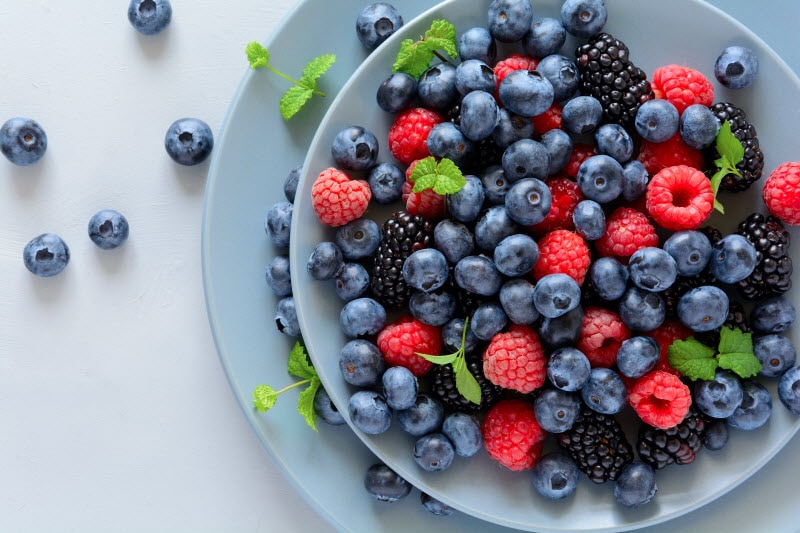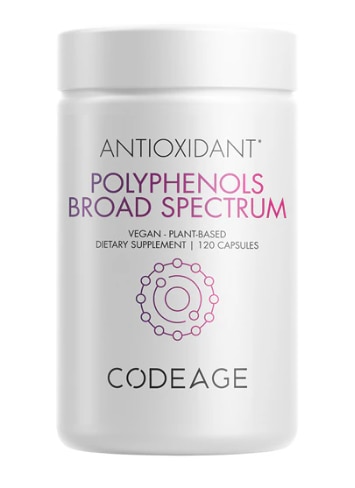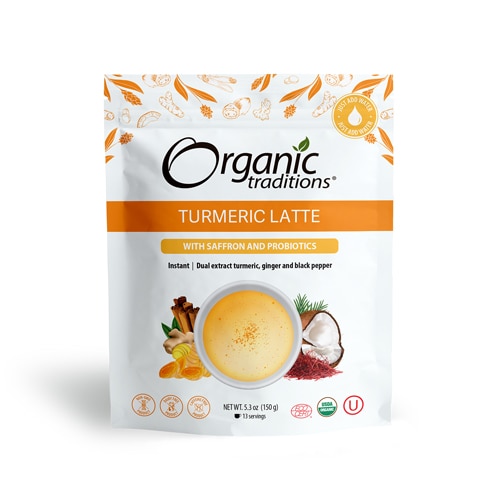You've likely heard of polyphenols in the context of something that makes a food "
super," though you may not be entirely sure what polyphenols are, why they’re beneficial or where to find them. Put simply, polyphenols are antioxidant compounds that are known to improve health. They’re found in plants, fungi and plant foods such as fruits, vegetables, mushrooms, herbs and spices,
red wine, chocolate,
coffee and tea.

When you consume polyphenols, you benefit from their ability to neutralize harmful molecules in the body called free radicals. Free radicals are highly reactive oxygen molecules that can damage our cells, leading to health concerns such as cancer, heart disease and diabetes. They’re naturally produced as a result of many normal body processes, such as breathing and digestion. But they’re also generated when we’re exposed to environmental factors such as UV sun rays, pollution, toxic chemicals and smoke.
Types of polyphenols
There are far more types of polyphenols than can be listed in a single article. In fact, there are over 8,000 known polyphenols. Scientists continue to investigate how different polyphenols interact in the human body, but a lot is already know.n The most common types of known polyphenols include the following:
Flavonoids
Over half of the polyphenols currently known are flavonoids, and they’re found in foods such as tea, soybeans, red wine, celery, red peppers, tomatoes, onions, citrus, bananas, peaches, parsley, leafy greens, apples and berries. Many types of flavonoids exist, including flavonols, flavanones, flavones, flavan-3-ols, catechins, chalcones and anthocyanins.
One well-known flavonoid you've likely heard of is quercetin, which is a flavanol found in leaves, vegetables, seeds and
grains.
Phenolic acid
Grapes, berries, walnuts, chocolate, coffee, green tea and
pomegranates contain
phenolic acids, which make up 30% of known polyphenols. There are two classes of phenolic acids: hydroxycinnamic and hydroxybenzoic acids. Plant skins, fruits, and leaves contain the most phenolic acids.
Polyphenolic amides
There are two groups of polyphenolic amides which include capsaicinoids and avenanthramides. Capsaicinoids are found in capsaicin-containing foods such as chili peppers, while avenanthramides are found in oats.
Stilbenes
Stilbenes include
resveratrol which is well-known for giving wine and grapes their potent superfood status, and pterostilbene, also found in grapes and blueberries.
Single-type polyphenols
Many polyphenols are of a single type instead of multiple subgroups or types. These include polyphenols such as curcumin, which is found in turmeric, lignans in seeds like flax and some greens, and ellagic acid, found in tree nut skins and berries.
The health benefits of polyphenols
Polyphenol-containing foods boast many proven benefits. Sometimes, it’s a challenge to decipher whether the polyphenols in the foods lead to better health or other aspects such as fiber, vitamins, minerals and additional phytonutrients. Regardless, consuming foods that have polyphenols is always a wise decision for your health.
†
Cell-protecting properties†
One of the
most researched benefits of polyphenols is their ability to protect cellular health. Polyphenols, including catechins, resveratrol, curcumin, and quercetin, have been
extensively studied for these beneficial effects.
†
Remember that since polyphenols act as antioxidants, they work to prevent cell damage which can lead to health problems. Polyphenols may also help signal cell death so the body can remove the unhealthy cells.
†
While research is ongoing, eating plenty of foods that contain polyphenols is highly associated with a reduced risk of poor cellular health.
Anti-inflammatory action†
Polyphenols are known to offer anti-inflammatory benefits, which can help protect you from inflammation-related health issues.
† One
long-term survey study showed that polyphenol lignans in the diet had a positive effect on inflammation. In the study, those who consumed the most lignans demonstrated lower inflammatory markers than those who did not consume a lignan-rich diet.
†
Heart protection
Another action of polyphenols is to support
blood vessel health. Having healthy blood vessels is critical to overall cardiovascular and heart health.
†
A
review of the research on the role of polyphenols and human health by the Department of Nutrition at the Harvard TH Chan School of public nutrition revealed consuming polyphenol-containing foods might support heart health in a few ways. Researchers concluded that polyphenols can support healthy blood pressure and cholesterol levels. Specific polyphenols investigated for heart health included flavonoids, lignans and resveratrol.
†
Gut microbiome balance
The
gut microbiome plays a role in several aspects of health, including healthy digestion, immune system health, mental well-being and more.
Polyphenols might help promote a balanced microbiome by supporting beneficial bacteria growth in your gastrointestinal tract while keeping unwanted bacterial growth at bay. Foods like berries and green tea have been studied for their potential to help grow good bacteria while slowing harmful ones like E. coli, Salmonella and C. difficile.
†
Brain function
Certain polyphenols such as curcumin have been linked to
supporting healthy brain function and offering some
neuroprotective effects. Consuming certain polyphenol-containing foods, such as green tea, has been linked to
supporting cognitive health. Note that these studies examine participants’ total diets and don't necessarily prove that polyphenols are the sole contributing benefit.
†
Adding polyphenols to your diet
Adding polyphenols to your diet is as easy as consuming a wide range of colorful fruits, vegetables, grains, nuts and seeds and mushrooms. Foods exceptionally high in polyphenols include green tea, berries of all kinds, nuts, leafy greens, onions, mushrooms, citrus and any fruit or vegetable you like.
Here are some ideas for a polyphenol-rich diet:
- Add berries and nuts with the skin, such as raw almonds, to oatmeal
- Zest and juice citrus fruit into yogurt, stir fry, soup, salad or oatmeal
- Choose organic fruits and vegetables such as carrots, apples and grapes and eat them as-is with their polyphenol-rich skins
- Bake whole grain muffins and bread with citrus zest, whole cranberries and oats
- Add flaxseed to baked goods, cereal and oatmeal, or toss on top of soup and salads
- Toss black beans or white beans into soups or salads, or mash them and mix with garlic, chives and lemon for a tasty sandwich filling
- Use herbs like parsley, basil, rosemary, and thyme and spices such as cumin, turmeric, and cinnamon in your baking, cooking, sauces, and dressings
- Learn how to plant an Immunity Garden and reap the rewards for your health
Another way to add polyphenols to your daily routine is to take a high-quality supplement made from a blend of whole foods that are rich in a range of these health-promoting plant compounds such as
Codeage’s Broad-Spectrum Vegan Polyphenols, which contains 16 different polyphenols from pomegranate, turmeric, quercetin dihydrate, noni (fruit-bearing tree in the coffee family), and acai (a grapelike fruit harvested from acai palms), grape seed extract, green tea leaf extract, blueberry powder, celery seed extract and more.
†These statements have not been approved by the Food and Drug Administration. These products are not intended to diagnose, treat, cure or prevent disease.
Featured Product

 When you consume polyphenols, you benefit from their ability to neutralize harmful molecules in the body called free radicals. Free radicals are highly reactive oxygen molecules that can damage our cells, leading to health concerns such as cancer, heart disease and diabetes. They’re naturally produced as a result of many normal body processes, such as breathing and digestion. But they’re also generated when we’re exposed to environmental factors such as UV sun rays, pollution, toxic chemicals and smoke.
When you consume polyphenols, you benefit from their ability to neutralize harmful molecules in the body called free radicals. Free radicals are highly reactive oxygen molecules that can damage our cells, leading to health concerns such as cancer, heart disease and diabetes. They’re naturally produced as a result of many normal body processes, such as breathing and digestion. But they’re also generated when we’re exposed to environmental factors such as UV sun rays, pollution, toxic chemicals and smoke.




